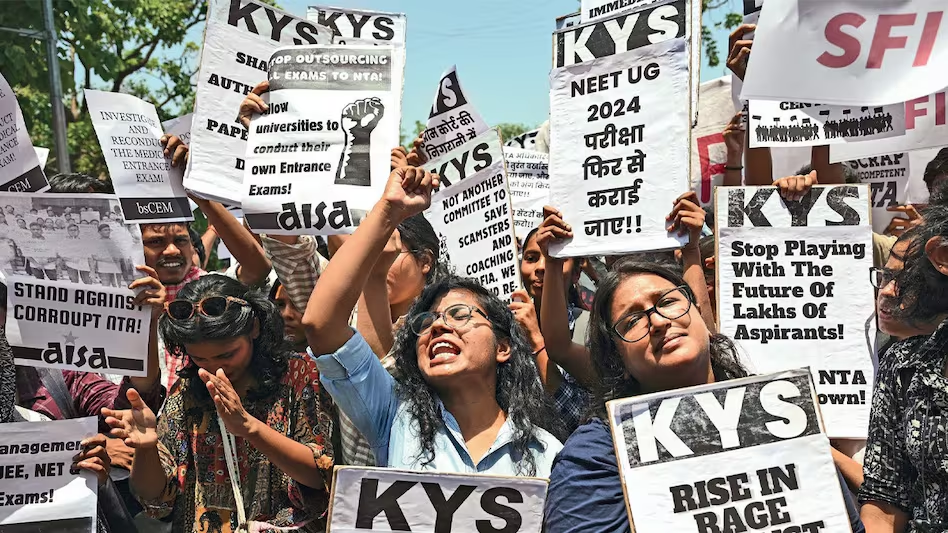The National Eligibility cum Entrance Test (NEET) is the gateway to undergraduate medical courses in India. Each year, hundreds of thousands of students vie for a spot in medical colleges, making it one of the most competitive exams in the country, and it has always had a section of the population that has perceived it negatively. However, NEET 2024 has been embroiled in some significant controversy, casting a shadow over its credibility and fairness.
NEET Structure and Importance
First the basics: NEET is the sole entrance exam for undergraduate medical courses in India. It determines the fate of aspiring doctors and is a crucial step for those wishing to pursue a career in medicine. The exam consists of 200 multiple-choice questions (MCQs), of which candidates must answer 180. The total score is 720, with four marks awarded for each correct answer and one mark deducted for each incorrect response. Unanswered questions do not impact the score, but selecting multiple answers results in a penalty.
NEET 2024: The Numbers and the Controversy
On May 5th, 2024, approximately 24 lakh students appeared for NEET. This year, however, the exam has been mired in allegations of malpractice, raising significant concerns about its integrity. Reports emerged of paper leaks, unfair marking, and the controversial awarding of grace marks, leading to widespread uproar across the country.
Allegations of Paper Leak
One of the most severe accusations involves the alleged paper leak in Rajasthan. It was reported that some students received the exam paper with pre-marked answers, giving them an unfair advantage. This incident has not only shaken the confidence of the examinees but has also put the National Testing Agency (NTA), which conducts the exam, under intense scrutiny.
The Grace Marks Debacle
Adding to the controversy, the NTA awarded grace marks to 1,563 students due to various disruptions during the exam. This decision sparked outrage among other candidates who felt this was an unfair advantage. The matter escalated to the Supreme Court, which subsequently scrapped the grace marks, leaving affected students with two choices: retake the exam or accept a new ranking without the grace marks.
Perfect Scores and Suspicion
The 2024 NEET results raised eyebrows when 67 students achieved a perfect score of 720, with eight students from the same exam centre. Such anomalies have fuelled suspicion and questions about the exam’s fairness and transparency.
NEET Exam Scandal in Godhra
The Gujarat Police recently uncovered a significant cheating scandal at a NEET exam centre in Godhra. The investigation revealed that candidates were using Bluetooth devices to receive answers during the examination. Several individuals, including candidates and middlemen, were arrested in connection with this sophisticated cheating operation. The scandal has raised serious concerns about the integrity of the NEET examination process and the measures in place to prevent such malpractices.
Authorities have indicated that the cheating ring involved high-tech equipment to facilitate the transmission of answers to students during the test. This incident highlights the ongoing challenges in ensuring a fair and transparent examination process for one of India’s most crucial entrance tests for medical education.
Political Reaction and Call for Abolition:
The scandal has also sparked a political reaction, particularly from the Dravida Munnetra Kazhagam (DMK) party. The DMK has criticized the Bharatiya Janata Party (BJP)-led government for the irregularities associated with the NEET exams. They have called for the abolition of the NEET, arguing that the exam has consistently been plagued by issues of fairness and transparency. The DMK’s stance highlights the ongoing debate over the efficacy and integrity of national entrance exams in India.
For more detailed information, you can read the full articles on The Hindu and Times of India.
The National Eligibility cum Entrance Test (NEET) is often seen as the ultimate gatekeeper for aspiring doctors in India. It’s the all-important exam that determines whether your dream of donning a white coat and a stethoscope will become a reality or remain a distant fantasy. But like any significant milestone, NEET comes with its own set of pros and cons. Let’s dive into the benefits and drawbacks of this much-debated exam.
Advantages of NEET
Uniformity and Standardisation
NEET ensures a uniform standard for medical education across the country. No more fretting over different state exams and varying difficulty levels. NEET brings everyone to the same playing field, ensuring that the selection criteria are consistent nationwide.
Merit-Based Selection
NEET is merit-based, ensuring that only the most deserving candidates make it to medical colleges. It eliminates the possibility of nepotism or donations influencing admissions, making the process fairer for everyone.
Wider Reach
Since NEET is a national-level exam, it opens doors to a variety of medical colleges across India. Students from any corner of the country can aspire to get into prestigious institutions without being limited to their home states.
Simplified Admission Process
One exam, one result. The simplicity of the NEET exam streamlines the admission process, reducing the stress of preparing for multiple entrance tests. It saves time, money, and effort for students and their families.
Reduced State Discrepancies
By replacing numerous state-level exams with a single national test, NEET reduces the discrepancies in educational standards and evaluation methods across different states.
Disadvantages of NEET
High Pressure and Stress
With everything riding on one exam, the pressure on students is immense. The high stakes can lead to anxiety, stress, and, in extreme cases, severe mental health issues.
Language Barrier
NEET is primarily conducted in Hindi and English, which can be a significant disadvantage for students from non-Hindi speaking regions or those who have studied in regional languages.
Urban-Rural Divide
Access to quality coaching centres and study materials is more readily available in urban areas, putting rural students at a disadvantage. The disparity in resources can skew the playing field.
Economic Disparity
Preparation for NEET often requires enrolling in expensive coaching classes, which not every student can afford. This economic disparity can influence outcomes, favouring those from more affluent backgrounds.
Cheating and Malpractices
Recent scandals, like the Bluetooth cheating scheme in Godhra, highlight vulnerabilities in the system. Despite stringent measures, malpractices continue to plague the exam, undermining its credibility.
One Size Doesn’t Fit All
The single-exam system may not account for diverse educational backgrounds and learning environments. Different states have different syllabi, and a uniform exam might not reflect the varied educational exposures of students.
Broader Issues and Challenges
The NEET controversy highlights broader systemic issues within the Indian education system. Students, parents, and educators have called for reforms to ensure transparency and fairness. One of the suggested solutions is to conduct the exam online, similar to other competitive exams in India, to reduce the chances of malpractice and enhance the exam’s integrity.
The Importance of Transparency and Reform
Given the significant role NEET plays in shaping the futures of aspiring medical professionals, it is essential that the process remains transparent and fair. The recurring issues of paper leaks, cheating scandals, and questionable scoring practices undermine the credibility of the exam. Implementing robust anti-cheating mechanisms, increasing scrutiny, and potentially transitioning to an online format could help restore trust in this crucial examination system.
The Future of NEET and Medical Education in India
The controversies surrounding NEET 2024 underscore the need for substantial reforms in how the exam is conducted. Ensuring the integrity of the examination process through technological solutions and stringent oversight is imperative for maintaining its credibility. With the right reforms, NEET can continue to serve as a fair and reliable gateway to medical education in India.
NEET is more than just an exam; it is a stepping stone for millions of aspiring doctors in India. The controversies of 2024 have exposed vulnerabilities that need immediate attention. Ensuring a fair and transparent process is crucial for maintaining the credibility of NEET and the dreams of countless students.
Also read: Covishield controversy




